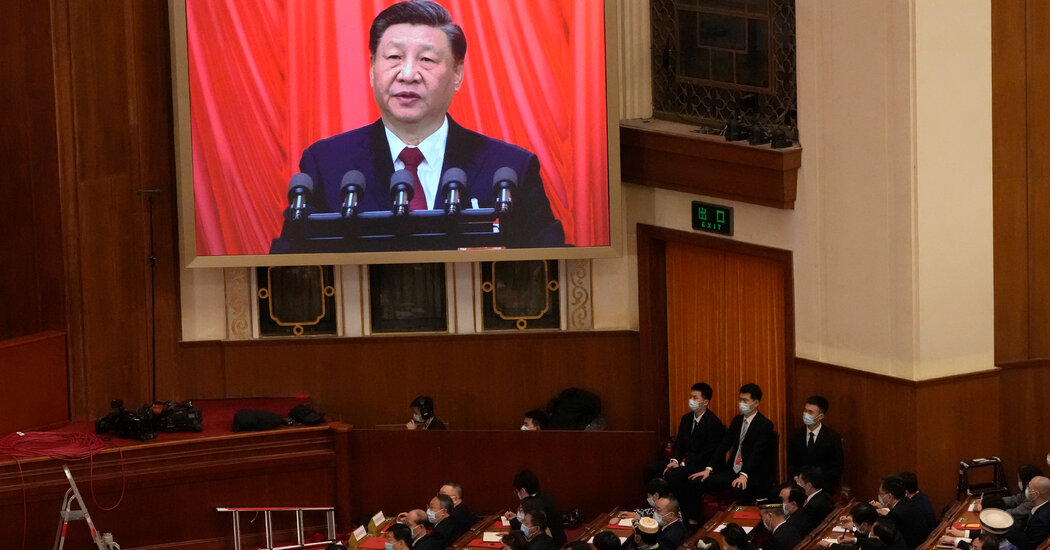WASHINGTON — China, under growing pressure from top international policymakers, appeared to indicate this week that it is ready to make concessions that would unlock a global effort to restructure hundreds of billions of dollars of debt owed by poor countries.
China has lent more than $500 billion to developing countries through its lending program, making it one of the world’s largest creditors. Many of those countries, including several in Africa, have struggled economically in the wake of the pandemic and face the possibility of defaulting on their debt payments. Their problems have been compounded by rising interest rates and disruptions to supplies of food and energy as a result of Russia’s war in Ukraine.
The United States, along with other Western nations, has been pressing China to allow some of those countries to restructure their debt and reduce the amount that they owe. But for more than two years, China has insisted that other creditors and multilateral lenders absorb financial losses as part of any restructuring, bogging down a critical loan relief process and threatening to push millions of people in developing countries deeper into poverty.
A breakthrough would offer an economic lifeline to vulnerable nations at a time of sluggish growth and uncertain financial stability, and it would signal a renewed interest from China in economic diplomacy.
Economists and development experts are watching carefully to determine if China is serious about easing the loan forgiveness logjam and if its talk will be followed by action. By some calculations, the world’s poor countries owe around $200 billion to wealthy nations, multilateral development banks and private creditors. Leaders of the world’s advanced economies have been grappling in recent months with how to avert financial crises in teetering markets such as Zambia, Sri Lanka and Ghana.
Africa’s private and public external debt has increased more than fivefold over the last two decades to about $700 billion and Chinese lenders account for 12 percent of that total, according to Chatham House, the London policy institute. Researchers for the Debt Relief for Green and Inclusive Recovery Project estimated in a recent report that 61 emerging market and developing economies were facing debt distress, and that more than $800 billion in debt must be restructured.
“China is facing increasing pressure from every quarter, including from other emerging market economies, to play a more constructive role in the negotiations over debt restructuring,” said Eswar Prasad, a former head of the International Monetary Fund’s China division, who said China’s intransigence had left it “increasingly isolated.”
There were indications this week that China was prepared to end that isolation as top economic officials from around the world convened at the spring meetings of the I.M.F. and World Bank. Participants expressed optimism that representatives from Beijing appeared to be ready to back off its insistence that multilateral lenders such as the World Bank, which provides low-interest loans and grants to poor countries, accept losses in the debt restructuring.
“My sense from the current context is we’re moving on to new steps,” David Malpass, the departing World Bank president, said at a news conference on Thursday, pointing to “progress on equal burden sharing.”
More on China
- Sodium Batteries: China is positioning itself to command the next big innovation in rechargeable batteries: replacing lithium with sodium, a far cheaper and more abundant material.
- Ditching Prestige Jobs: Young people in the country are increasingly trading high-pressure, white-collar jobs for manual labor. They say it’s worth the financial sacrifice.
- Tourism: Despite loosened Covid restrictions and visa rules, the number of flights into China is still a small fraction of what it was before the pandemic. This is partly fueled by geopolitical tensions.
- Lengthy Sentences: Xu Zhiyong and Ding Jiaxi, two human rights activists, were detained after organizing a small gathering to discuss human rights. The length of their sentences — 14 and 12 years in prison respectively — point to Beijing’s intolerance of dissent.
Kristalina Georgieva, the I.M.F.’s managing director, said she was “very encouraged” that a “common understanding” had been reached that could accelerate relief for countries such as Zambia, Ghana, Ethiopia and Sri Lanka.
“I always say the proof of the pudding is in the eating,” Ms. Georgieva said.
To restructure a country’s debt, creditors generally must agree to a combination of lowering the interest rate on the loan, extending the duration of the loan or writing off some of what is owed. China, which has faced an array of domestic economic challenges over the last three years, has been reluctant to take losses on debt and has pushed for other lenders, such as the World Bank, to incur losses.
The urgency for a resolution was palpable among countries that are most in need of relief. Zambia defaulted in 2020 and has been trying to restructure $8.4 billion that it owes through a program established by the Group of 20 nations. It owes about $6 billion to Chinese lenders, and its total debt to foreign lenders is approaching $20 billion.
“Zambia urgently needs debt relief,” Situmbeko Musokotwane, Zambia’s finance minister, told The New York Times. “Delay on debt restructuring puts our currency under pressure, excludes Zambia from capital markets and makes it difficult to attract much-needed foreign direct investment.”
Ghana appealed to the Group of 20 nations this year for debt relief through a fledgling program known as the Common Framework after securing preliminary approval for a $3 billion loan from the I.M.F. That money is contingent on Ghana’s receiving assurances that it can restructure the approximately $30 billion that it owes to foreign lenders. Officials from Ghana have been meeting with their Chinese counterparts about restructuring the $2 billion that it owes China.
On Friday, Ghana’s finance minister, Ken Ofori-Atta, lamented that 33 African nations were saddled with interest payments that approached or exceeded what their governments spent on health and education and expressed disappointment that advanced economies had been slow to act.
“Honestly, it is disheartening to watch Africa struggle in this way, especially considering the potential loss of productivity over the next decade should African economies buckle under the weight of suffocating debts,” Mr. Ofori-Atta said at an Atlantic Council event on Friday.
But it remains uncertain how far China is willing to go.
Brad Setser, a senior fellow at the Council on Foreign Relations, said that it was not clear what financial terms Beijing would accept when restructuring debt but that it appeared to be taking a “positive step” that would remove “a financially unwarranted roadblock to any progress.”
But given the grinding pace of the talks, big investors in emerging markets are not counting on quick resolutions.
“We are starting to see tokens of flexibility from China on their stance in sovereign debt restructuring, but complexities abound,” said Yacov Arnopolin, emerging markets portfolio manager at PIMCO. “Near term, we don’t expect a clear-cut solution on China’s willingness to take losses.”
China’s reluctance has been another source of tension with the United States, which has expressed concern that Beijing’s onerous lending terms and refusal to renegotiate have amplified the financial problems that developing countries are facing. Treasury Secretary Janet L. Yellen said this week that she would continue to press her Chinese counterparts to improve the restructuring process but that she was encouraged that China had recently expressed a willingness to help Sri Lanka restructure its debt.
People familiar with Chinese economic policymaking said domestic politics had made it hard for China to make difficult decisions last autumn and over the winter about accepting possible losses on its loans.
In October, the Communist Party held its once-in-five-years national congress and chose a new team of senior party officials to work with Xi Jinping, the country’s top leader. Maneuvering then began to reshuffle the government’s senior ranks, which had been expected during the annual session of the National People’s Congress in early March, although some changes of financial policymakers were unexpectedly delayed.
China is now ready to focus on addressing a wide range of economic issues, including international debt, the people said. However, Beijing still faces other challenges that may limit its willingness to bargain, including a commercial banking system that faces very heavy losses on loans to real estate developers and does not want to accept large losses on loans to developing countries at the same time.
Chinese officials offered support for the debt relief initiatives in broad terms this week.
Wang Wenbin, a spokesman for the Chinese Foreign Ministry, said on Friday that China had put forward a three-point proposal that included calling for the I.M.F. to more quickly share its debt sustainability assessments for countries that need relief, and for creditors to detail how they will carry out the restructurings on “comparable terms.”
After a meeting in Washington between Yi Gang, China’s central bank governor, and Mr. Musokotwane of Zambia, the Chinese central bank released a brief statement.
“They exchanged views on issues of common concern including bilateral financial cooperation,” it said.
Keith Bradsher contributed reporting from Beijing.
















Leave a Reply